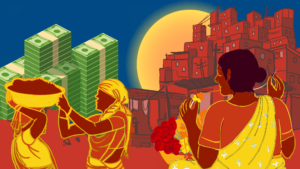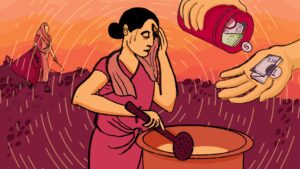Marginalised And Neglected, Nomadic Tribes Are At High Risk From Heatwaves
Nomadic tribes are particularly vulnerable to the heat crisis – they are not allowed to access common water sources, live in temporary settlements that trap heat and live mostly off outdoor occupations
- Priyanka Tupe
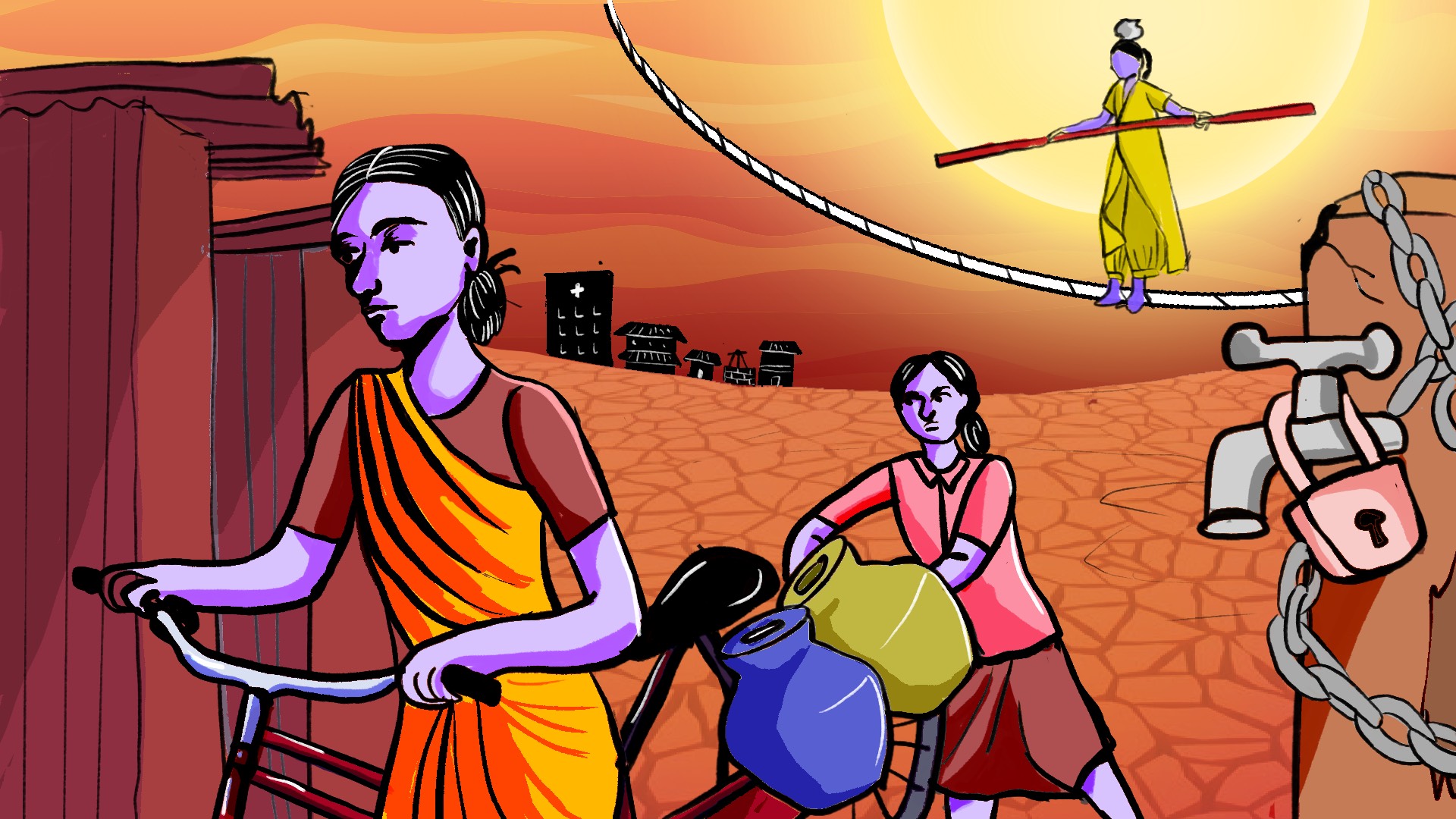
Two kilometers beyond the boundary walls of Manewadi, a village in Solapur’s Madha taluka, lies a settlement of about 30 families belonging to the Dombari tribe. One of the nomadic and denotified tribes (NT-DNT) of India, they are not allowed to access common water sources in the village and have to cycle 5-6 km to fetch it.
The Dombaris are allowed by the farmers in a neighbouring village to draw up to eight pots of water for ‘free’. But if they ask for more, they have to to labour on the lands and homes of the farmers for at least a couple of hours a day.
“We have to gather up the cow dung and clean their yards, cut fire wood and do other chores for them. Only then can we get more water from their wells. If we ask to use the taps or wells or water bodies in Manewadi, they say ‘we have spent lakhs of rupees on building the wells, why should you get the water for free?’” said Sangeeta Shinde.
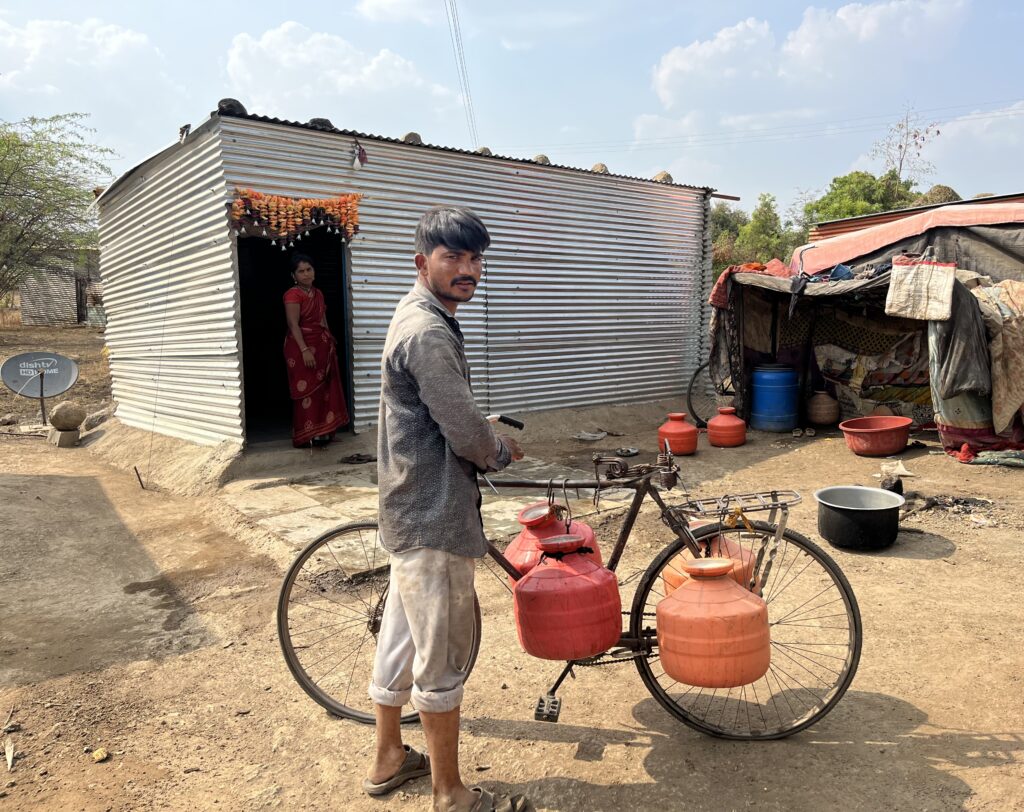
It was only after the water crisis of the Dombaris was covered extensively by Vijay Shinde, a local journalist with the daily Ekmat that the village administration installed two water tanks for the Dombaris last year. The tanks functioned for only two months, so the struggle for water continues.
“Even if we get enough money to build a well or dig our own borewell, we don’t have our own land on which to do that,” said Sangeeta.
The Dombaris of Manewadi do what they can to conserve water – drink less of it, and count each drop. “We don’t even get enough water to bathe everyday. Our children get to shower once a week. And then the upper caste people in the village say we are filthy so we cannot touch common water resources,” said Ramesh Shinde of Manewadi’s Dombari basti.
We saw some community members carrying water in large plastic pots tied to cycle carriers in the scorching heat of 3 pm. Children are not spared the task either.
“Sometimes I feel like I am blacking out in the heat. Other times I get a severe headache. Though the cycle carries the weight I have to still walk with it and push it,” said Sapana Pawar.
While the World health Organization (WHO) says, it’s necessary to drink at least 2-3 liters of water everyday, cool down with baths and stay hydrated during heatwaves, access to water for nomadic tribes is an everyday struggle.
India is experiencing increasingly intense summers precipitated by climate change, with temperatures soaring above 45°C. Last year was one of the hottest since 1901 and the heat claimed half a million lives worldwide every year. NT-DNT scholars say these numbers likely do not include heat-related fatalities among NT-DNT groups because of underreporting, lack of research, and systematic evidence-building.
As Behanbox has reported frequently, these extreme heat events result in public health crises, and lead to the loss of livelihood for the country’s most marginalised people. They also reduce labor productivity and exacerbate water and energy crises.
Nomadic tribes and denotified tribes are itinerant communities and an estimated 95% of them earn a living by working outdoors – as street acrobatics, petty street hawkers, and makers and sellers of utilitarian objects crafted from iron or stone. Some NT-DNT communities also put up small stalls of handcrafted artefacts at local fairs, others work as cane-cutters in western Maharashtra. Quite a few beg in public places. All this exposes them to extreme heat. There are no public provisions to ease their lives and no reference to their troubles in heat action plans.
Inadequate Housing
All the NT-DNT bastis we visited in four districts of the state across the year offer poor, temporary shelters — some are made by weaving together dried palm leaves and curtained by old sarees, others use plastic sheets and tarpaulin. Each pal (hut) measures no more than 100 square feet. There are no bathrooms and no toilets. NT-DNT communities have extremely poor access to the toilets which leads to multiple health issues.
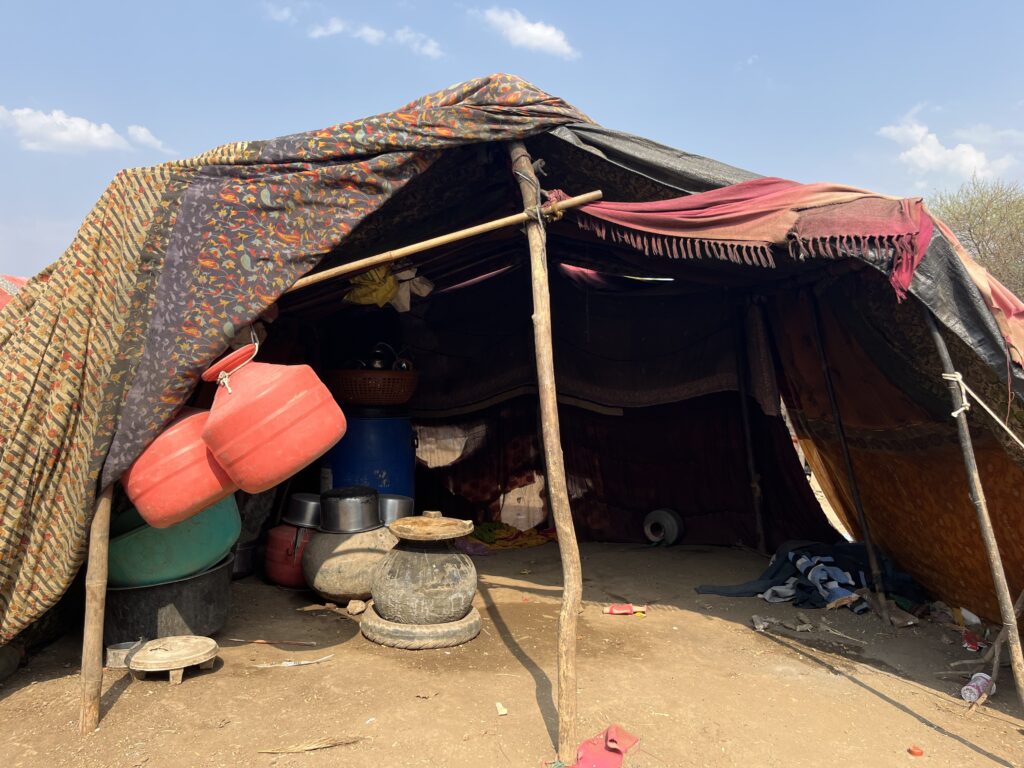
There are no windows to let the hot air escape or allow breeze in. The fans of those who have them stop working in summers when load shedding begins. Most families here do not have official electricity connections and draw power from neighbouring connections. This source is often cut off when it is discovered leaving homes in darkness and suffocating heat.
“My children develop boils and rashes in summer, but I can’t afford talcum powder to ease their discomfort,” said Sapna Pawar of Manewadi, while washing dishes outside her hut with a half filled bucket.
Apart from the makeshift pal, there were 5-6 pucca homes built with tin sheets in Mandewadi’s Domabari basti, a material that traps and keeps heat. “Sakali 10 nantar gharat bausch vatat nahi, patryamule khup garam hota, mhanun aamhi baherch zadakhali basto, sandhyakalparyant (past 10 am we can’t remain indoors because the tin heats up, so we sit outside under the tree till evening),” said Ganesh Shinde from the basti.
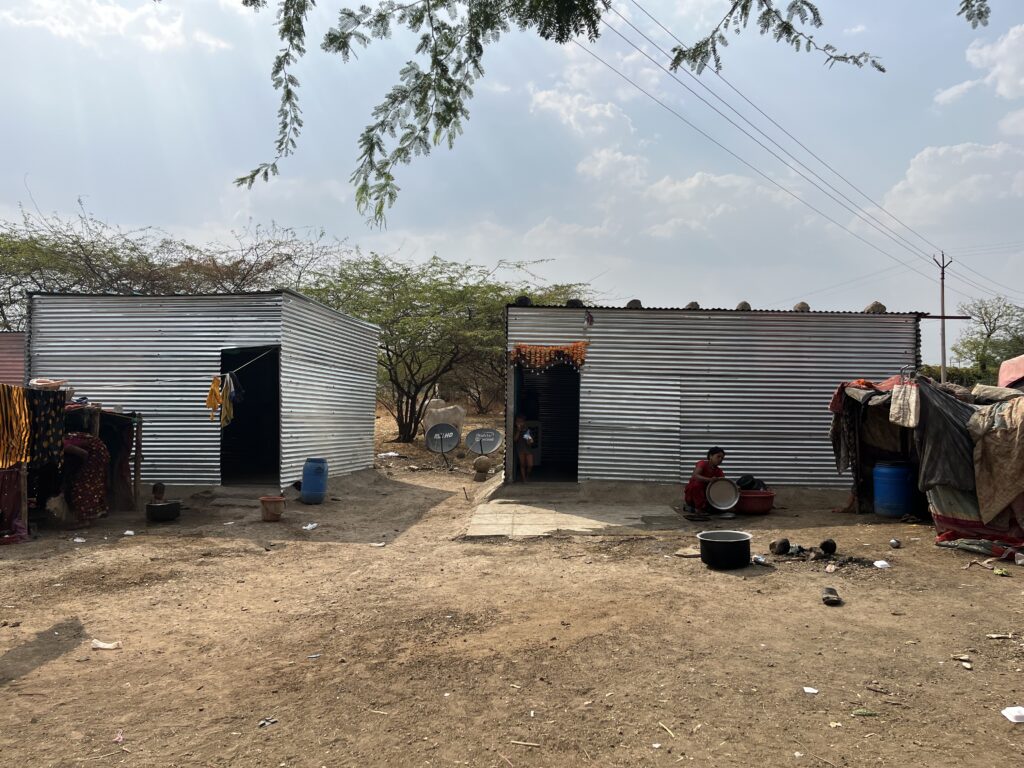
Anita* and her daughter Balibai* live in a hut on the footpath in Mumbai’s Fort area. A month ago, the India Meteorological Department (IMD) issued a yellow alert for Mumbai, warning of a spike in heat and humidity. Temperatures were expected to rise by 3 to 4 degrees Celsius, and residents were advised to take necessary precautions.
“This summer, it is as if one can’t breathe inside. Till five years ago, summers were bearable. Now there is no breeze even in the evenings and all we see is a pall of dust raised by construction work all over Mumbai,” said Balibai, who hails from the Pardhi community and migrated from Nanded in 2015.
The women also complained that if they sit out, with their saree pallu or dupatta off their shoulders for some relief from the gruelling heat, strangers walking past stare at them. At nights, when it gets too hot and stuffy inside the hut, the two step out and sleep out on the footpath. This again leaves them so vulnerable to harassment that they sleep with a sheet pulled over their heads despite the heat.
“Dusrya koni tras dila tar amahi tyana barobar saral karto, pan kadhi charsi-gardullyani tras dila aani polisala sangitala, tar police mhantat, ‘tumhi kashala rastyavar zopta’? Aata bai mansala haus asti ka rastyavar zopayachi, kiti bhiti vatate ( we can deal with most of this harassment on our own but if men who are drunk or stoned misbehave with us, we call the police. But they ask: ‘why are you sleeping on the road?’ No woman would want to sleep on the road,” said Balibai.
Behanbox has previously reported how homeless women endure scorching heat in daytime and spend sleepless nights in constant fear of sexual violence.
Food And Necessities
We met Suman Pawar, 55, in July last year. She lives in Savitrimai Nagar (formerly Khokadmal village) in Pune’s Shirur taluka. Suman hails from a Pardhi community and works as a farm laborer. At the time of the interview, she was just recovering from food poisoning. She and her daughters had consumed some fish curry that was a day old.
“We felt exhausted so the doctors suggested a saline drip for us all. I had Rs 800 with me so I got one injection for myself and two bottle salines for my daughters,” said Suman. She could not afford it so she refused a drip for herself. Most families like Suman from NT-DNT communities do not have refrigerators to preserve food items.
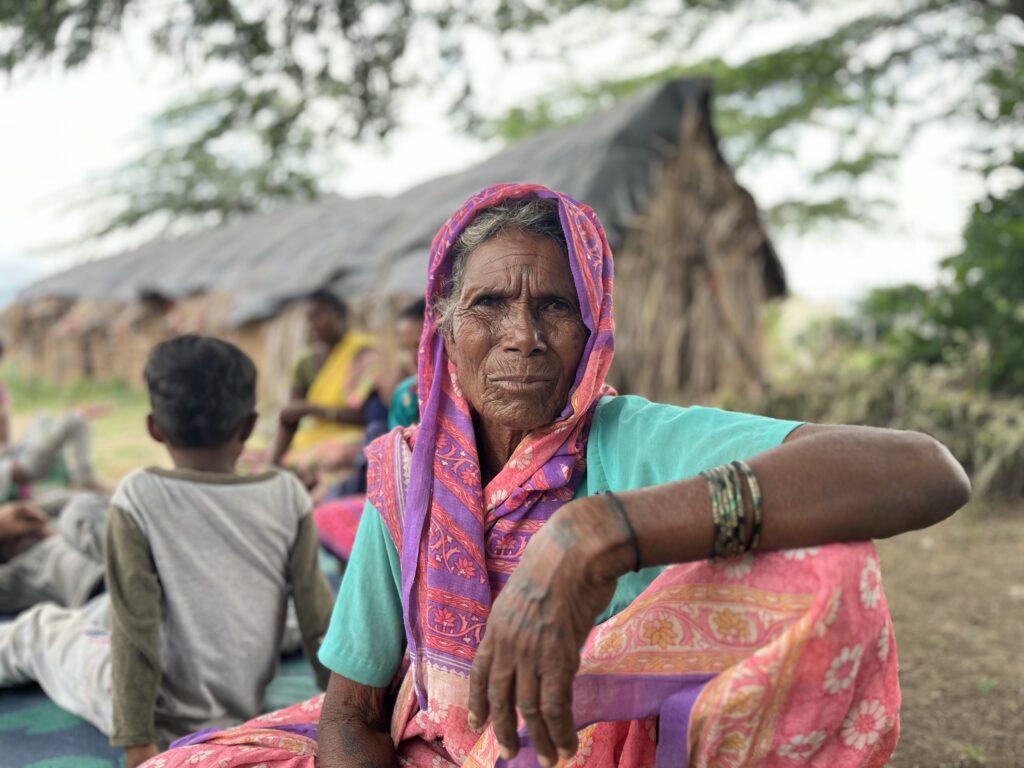
“We eat food even if it is stale. What can we do? We can’t afford to waste a single morsel of food. But I lost four days’ wages in the process,” Suman said. Women and children often collect leftover food from homes when they go begging door-to-door. But this food turns stale very fast in the heat.
Women we interviewed from Dombari, Pardhi, Vadari and Kanjarbhat communities told us that they cannot afford to buy food items that are recommended to cool and hydrate the body – curd, buttermilk, cucumber and fruits like watermelon, muskmelon, coconut water and so on.
“The everyday life of NT-DNT communities is so precarious (except for the very few who are settled) that they don’t think heat stress is a big issue,” said Sagar Naik, a PhD scholar from the Banjara community. “They have no resources, time or knowledge to mitigate heat-related challenges.”
We interviewed activists and academicians from the community such as Apparao Rathod, Prashant Chavhan and Ishwar Singh and they all said that there has been no research done on the impact of heat stress among NT-DNT communities despite their extreme vulnerability. Behanbox has previously reported that heat action plans often overlook marginalised communities, and have no understanding of their specific locational and social vulnerabilities. The current framework for measuring heat-related income loss is also inadequate, as it primarily focuses on temperature levels and health impacts, we reported recently.
The non-profit Mariwala Health Initiative conducted a study around the impact of heat stress on marginalised communities in Rajasthan, centered around Dalits and tribal communities like Bhils. “The study shows that Dalits and tribals are disproportionately affected by the heat, because of socio-economic inequalities and the lack of policies for them. Not only physical illnesses like weakness, body-pain, head-ache and skin infections but people’s mental health is also being affected due to rising temperatures,” said Ishwar Singh, one of the researchers who conducted this study.
Loss Of Livelihood
As we said, most NT-DNT communities engage in street-based occupations. The Dombaris, who perform acrobatics on the road for their livelihood, said their work days fall in the summer.
“It is extremely difficult for us, especially our children, to perform in this scorching heat. Also we no longer have the kind of audiences we used to have once,” said Ramesh Pawar.
“Vadari women crush stones and make grinders and other goods from them in open spaces but they cannot work outdoors in this heat. They also go from door-to-door selling these heavy items on their shoulders and that too becomes hard in this heat. Most women prefer to take on domestic work in these months” said Lalita Dhanawate, a community leader based in Navi Mumbai who is actively engaged with the issues of NT-DNT women.
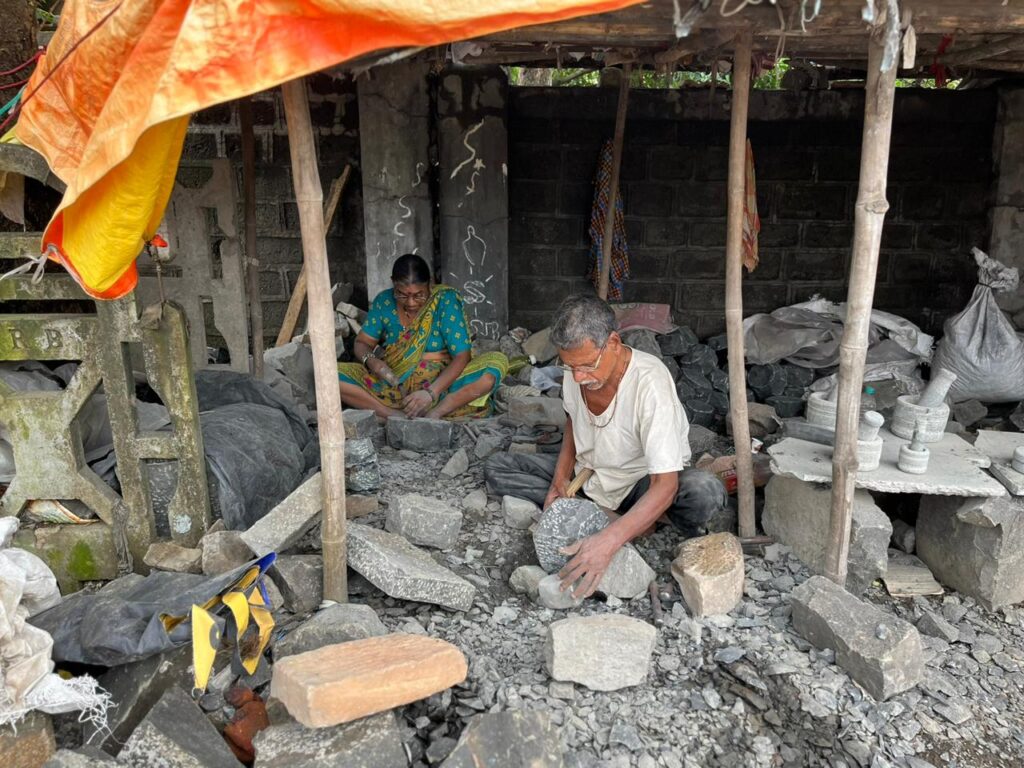
In Vidarbha region, communities like Banjaras and Dhangars collect mahua and other non- timber forest produce and sell it. But the number of mahua trees is reducing due to climate change. Behanbox has reported on how women from the NT-DNT communities in Vidarbha remain largely excluded from employment opportunities under the MGNREGS and their traditional means of livelihood, such as hunting, have also been impacted by the Wildlife Protection Act of 1972.
Prashant Chavhan, a researcher from the Banjara community, spoke of the institutional biases against the group. “NT-DNT’s dependency upon non-timber forest produce is criminalised by forest departments by denying them legal recognition as forest dwelling communities. Additionally, rising deforestation is hitting the availability of forest produce and reducing the tree cover that could have sheltered vulnerable communities, he added.
We believe everyone deserves equal access to accurate news. Support from our readers enables us to keep our journalism open and free for everyone, all over the world.
